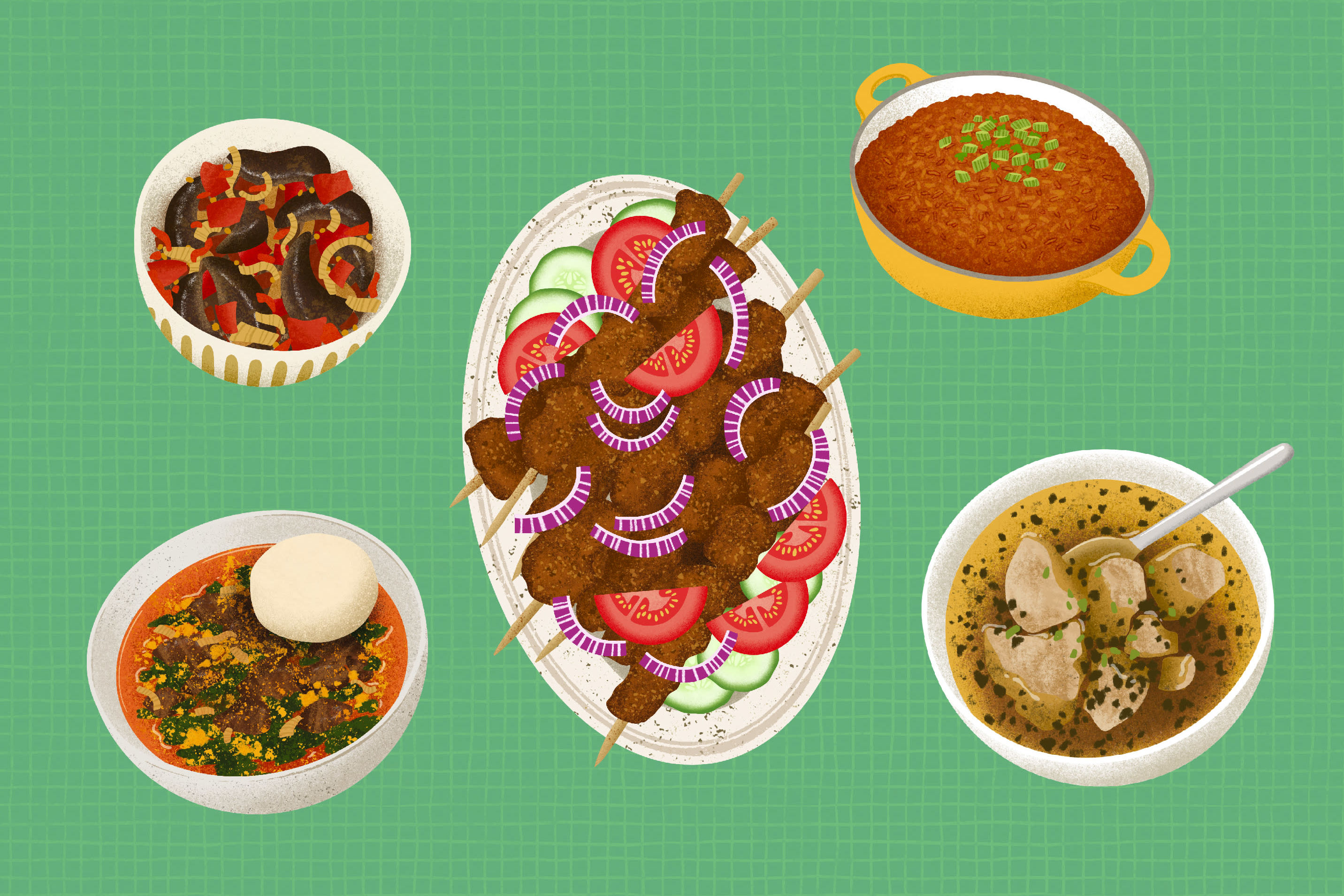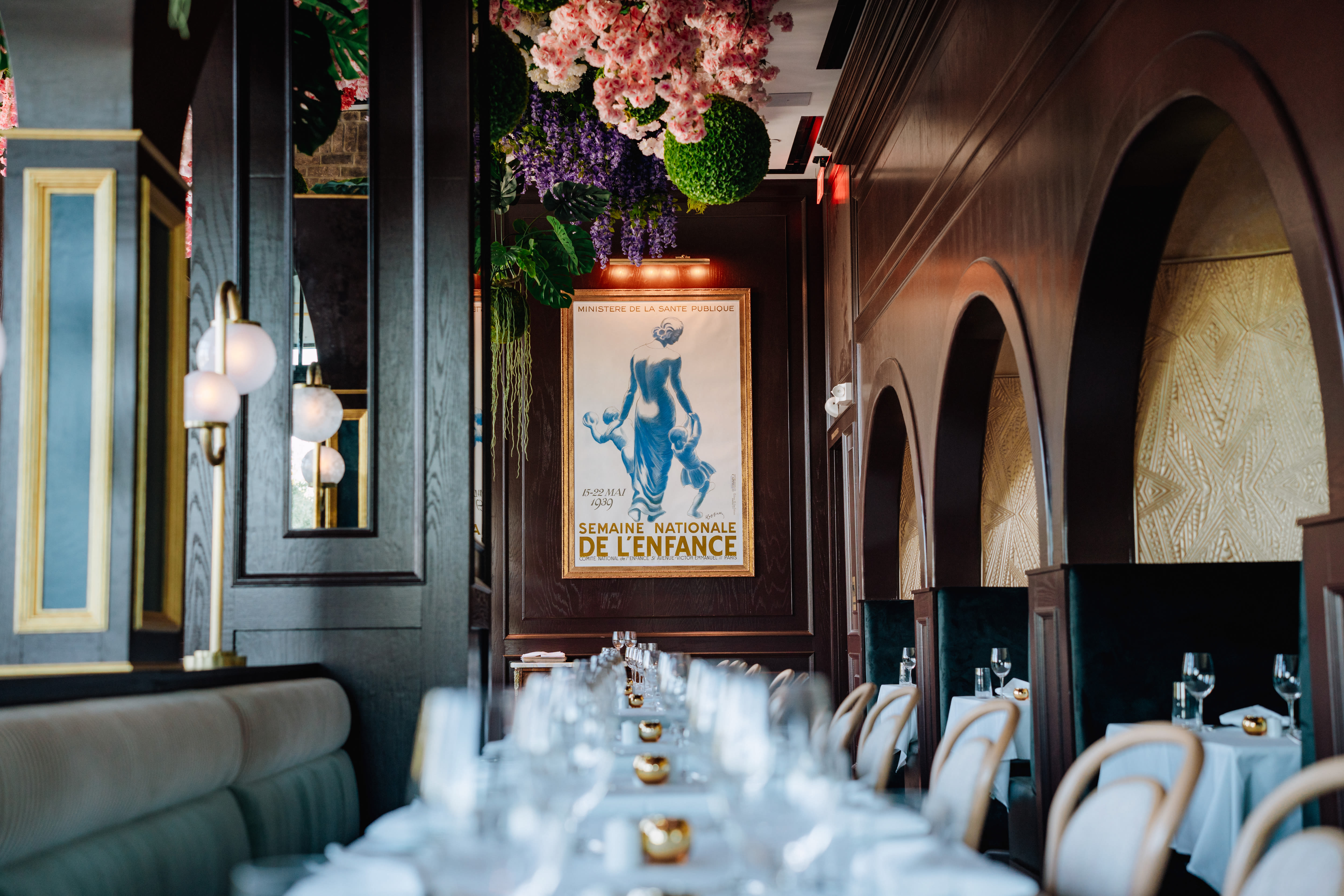ChòpnBlọk Finally Opens Its First Brick-and-Mortar

Image: Courtesy of StuffBenEats
Houston’s diversity spills over into its food scene, but when it comes to West African cuisine, chef Ope Amosu says further connection with the community is needed. That’s why he decided to expand ChòpnBlọk beyond its home in Post Houston with a brick-and-mortar in Montrose.
The new location, which had its soft opening in late September, spans 3,000 square feet and includes a larger kitchen than the stall downtown, allowing for greater culinary capabilities and experimental menu items. Upon walking in, guests are greeted with an environment that radiates of West African culture through art, textiles, and other design touches.
“The brick-and-mortar has always been the plan,” Amosu says. “The plan is to fulfill the mission, which is to make the culture more accessible.”
ChòpnBlọk’s menu now offers new items like the Buka Blọk Pairing, a West African red stew; Aunty Mawa’s maafe, a creamy Senegalese peanut curry; and the Black Star Blọk Pairing, a waakye fried rice with Ikoyi shrimp and yassa curry. The new location also has dessert on the menu including a plantain bread pudding.
The Montrose restaurant marks the debut of ChòpnBlọk’s cocktail program, created in partnership with consultant Alexis Mijares, which expands on the bold West African flavors found in the food. The cocktails are crafted using Black-owned and African spirits, as well as native ingredients to the continent.

Image: Courtesy of StuffBenEats
With the success and recognition ChòpnBlọk has gained over the last few years, including as a 2024 James Beard semifinalist for Emerging Chef, one would think that Amosu has been in the restaurant industry for decades, but his story as a chef actually began just seven years ago.
Prior to working in the restaurant industry, Amosu—who has a marketing degree and an MBA from Rice University under his belt—was in the corporate world of oil and gas, working stints in Philadelphia and other places around the world.
During his time away from home, he kept noticing two common themes. It wasn’t easy for him to access basic cultural elements that he had been used to as a child of Nigerian immigrants. And he had to go out of his way to find the immigrant community to access what he was missing.
Over time, Amosu also observed the way hospitality groups were sharing the beauty of culture to a broad audience through food, which impressed and inspired him. Then, one day when he was with his sister in Washington, DC, chowing down on some Cava—back when it wasn’t in Houston—an idea crossed their minds: “What if we had a Nigerian version of Cava?” This was the first spark that got him thinking about his future plans.
While at a conference in Houston in January 2017, Amosu came across Piada, a fast-casual Italian restaurant, and became obsessed with his new dream, even taking it as far as getting a second job at Chipotle as a prep cook to further understand how these types of concepts operate.
“I wanted to create the first contemporary West African–inspired concept that shares the beauty of my culture with the world and makes it accessible for all,” Amosu says.
Shortly after this, everything began to fall into place. Amosu’s day job moved him back home to Houston, which allowed him to dive headfirst into learning more about West African food. He reached out to home cooks who were known for a specific dish and asked them to train him. Not only was he learning how to make the traditional West African dishes, he was also internalizing them, taking his own life experiences to create dishes that had a sense of representation.
“I’ve lived this,” Amosu says. “This is my experience, it’s where I come from.”
The next step: ensuring that his food would reach a wider audience. Once Amosu felt ready, he asked his cousin if he could rent out the clubhouse of his apartment complex in Briar Grove to host pop-up dinners. The series began in March 2018, often consisting of 20 people who represented different types of customers, who would give feedback about what they loved and what could be worked on.
These dinners not only helped him introduce West African flavors to more people, but also created relationships and a following. At first, the goal was to bring in new people with every dinner to get a variety of perspectives, but eventually, people were asking to be invited back.
Thanks to the pop-ups’ growing popularity, Amosu began to partner with restaurants for takeovers on slower days, turning their dining rooms into ChòpnBlọk for the night. This allowed him to invite past guests and have a more public-facing platform. From 2018 up until when the pandemic hit, ChòpnBlọk gained tons of momentum, all while Amosu was still holding onto his corporate job. When the world shut down, he got stuck in Nigeria for two months, but he used this to his advantage, furthering his education on different dishes with the help of locals there.
In November 2021, ChòpnBlọk officially got its first permanent space: a food stall in Post Houston. That’s when Amosu finally left his energy job—managing both at the same time was quite an experience, so he was happy to give it up.
Amosu knew his dream wasn’t going to stop there. With his goal of making the culture more accessible, he wanted to open a brick-and-mortar to make it even easier for people to enjoy West African cuisine, which is why he landed on what he calls “restaurant row” in Montrose. Amosu says the location on Westheimer was also chosen for its history, because the address is within the original boundaries of Freedmen’s Town, one of the oldest Black communities in the city. He says this pays respect to the overall Black African diaspora.

Image: Courtesy of StuffBenEats
Aside from great food and hospitality, he wants the location to double as a community space in efforts to further highlight the West African experience in Houston. Thanks to the restaurant’s design by Gin Design Group, it’s equipped with a PA system, making it the perfect spot for events. Diners can also buy a selection of cookbooks and art from Third Ward’s Kindred Stories, helping with the representation of West Africa and its culture.
In line with his marketing expertise, Amosu created a newsletter for the restaurant, Smallchòps, which features bite-size stories about different West African artists, entrepreneurs, writers, and other important figures who work to bring even more awareness to the culture. Amosu says it’s a way to celebrate the African diaspora and its impact in a digestible format.
Amosu acknowledges that although he’s been in the game for only seven years and doesn’t have a traditional culinary background, he still has so much to contribute. And as he looks to the future, he hopes to move the needle when it comes to West African representation.
“What I don’t have in classical training, I have in cultural training,” Amosu says.




